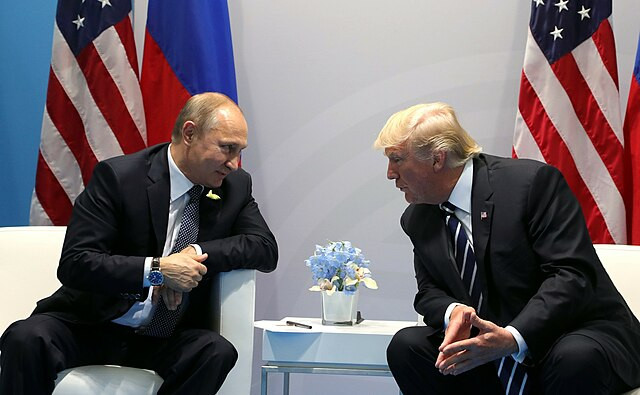Preparations for a summit between U.S. President Donald Trump and Russian President Vladimir Putin are underway, signaling a dramatic shift in U.S. foreign policy as Washington and Moscow discuss the future of Ukraine, Russian Deputy Foreign Minister Sergei Ryabkov said Saturday. The proposed meeting, which remains in its early planning stages, comes amid growing concerns from Kyiv and European allies that the U.S. is sidelining Ukraine in negotiations to end the nearly three-year-long war.
"The question is about starting to move toward normalizing relations between our countries, finding ways to resolve the most acute and potentially very, very dangerous situations, of which there are many, Ukraine among them," Ryabkov told Russian state media. He added that U.S. and Russian envoys could meet within the next two weeks to lay the groundwork for further negotiations at the senior level.
The announcement follows a meeting between U.S. and Russian officials in Saudi Arabia earlier this week, where Secretary of State Marco Rubio and his Russian counterpart, Sergey Lavrov, agreed to pursue closer diplomatic and economic ties. The discussions also included the possibility of Ukraine giving up its ambitions to join NATO and ceding 20% of its territory currently occupied by Russian forces.
After the meeting, Rubio told reporters that the two sides had broadly agreed on three key objectives: reopening embassies, establishing a high-level team to support Ukraine peace talks, and exploring expanded economic cooperation. "We're going to need to have vibrant diplomatic missions that are able to function normally in order to be able to continue these conduits," Rubio said.
However, no Ukrainian representatives were present at the Saudi meeting, fueling concerns that Kyiv is being pressured into a settlement it does not support. Ukrainian President Volodymyr Zelenskyy criticized the talks, saying Ukraine would not accept any agreement reached without its participation. He postponed his own planned trip to Saudi Arabia in protest.
On Friday, Trump appeared to soften his earlier rhetoric that had blamed Kyiv for the war, acknowledging in a Fox News interview that "Russia attacked." However, he maintained that Zelenskyy and former President Joe Biden "shouldn't have let him attack." Later in the day, Trump told reporters at the White House that the war "doesn't affect the United States very much. It's on the other side of the ocean. It does affect Europe."
The proposed summit between Trump and Putin is drawing concern from U.S. allies in Europe, who worry that a deal between Washington and Moscow could come at Ukraine's expense. European leaders have reiterated their commitment to ensuring Kyiv has a seat at the negotiating table.
British Prime Minister Keir Starmer is scheduled to visit Washington next week for talks focused on Ukraine. Starmer spoke with Zelenskyy on Saturday and reaffirmed "the U.K.'s ironclad support for Ukraine and commitment to securing a just and enduring peace," his office said.
In London, thousands of protesters marched to the Russian Embassy on Saturday, demanding increased military aid to Ukraine and calling for Russian forces to withdraw. Demonstrators chanted, "Trump, you're no friend, you're a traitor to Ukraine."
Meanwhile, European Union leaders have been scrambling to coordinate their response. Ukrainian Foreign Minister Andrii Sybiha has been in contact with top diplomats from France, Spain, Poland, Finland, and the Baltic states in recent days, seeking to ensure that European allies remain united in backing Kyiv. "Allowing Putin to succeed would have disastrous consequences for the stability and common way of life of every family in Europe and the U.S.," Sybiha posted on X. "The cost of appeasement will be paid by ordinary people."
The United States has also put forward a draft United Nations resolution calling for a swift end to the war, though it falls short of demanding a full Russian withdrawal. The U.S. resolution, which will be voted on by the General Assembly on Monday, urges "a lasting peace between Ukraine and Russia."
By contrast, a competing resolution backed by the European Union and Ukraine explicitly calls for Russia to withdraw all forces from Ukrainian territory. The U.S. measure has drawn criticism from Kyiv and European capitals, where leaders view it as a potential concession to Moscow.
Rubio defended the resolution, saying that "this is the moment to commit to ending the war" and that "while challenges may arise, the goal of lasting peace remains achievable."
The diplomatic maneuvering reflects a fundamental shift in Washington's approach to the conflict under Trump, who has long been skeptical of U.S. military aid to Ukraine and has sought to redefine relations with Moscow. His administration has framed the current talks as a pragmatic effort to end a costly war and refocus American resources elsewhere.
The Kremlin, meanwhile, has welcomed the prospect of negotiations. "We have also already mentioned that this position is more favorable to us than the previous administration, and that here we absolutely agree with the American administration," Kremlin spokesman Dmitry Peskov said Saturday.






